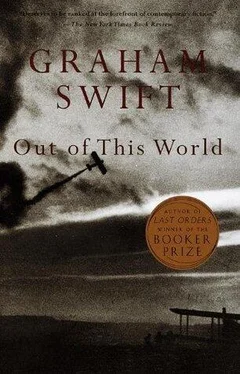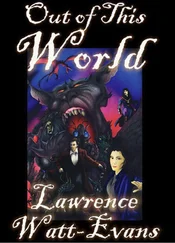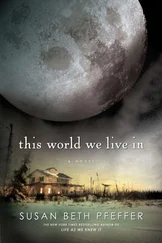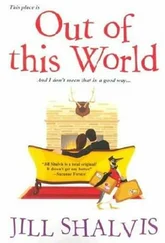Graham Swift - Out of This World
Здесь есть возможность читать онлайн «Graham Swift - Out of This World» весь текст электронной книги совершенно бесплатно (целиком полную версию без сокращений). В некоторых случаях можно слушать аудио, скачать через торрент в формате fb2 и присутствует краткое содержание. Год выпуска: 2012, Издательство: Vintage, Жанр: Современная проза, на английском языке. Описание произведения, (предисловие) а так же отзывы посетителей доступны на портале библиотеки ЛибКат.
- Название:Out of This World
- Автор:
- Издательство:Vintage
- Жанр:
- Год:2012
- ISBN:нет данных
- Рейтинг книги:3 / 5. Голосов: 1
-
Избранное:Добавить в избранное
- Отзывы:
-
Ваша оценка:
- 60
- 1
- 2
- 3
- 4
- 5
Out of This World: краткое содержание, описание и аннотация
Предлагаем к чтению аннотацию, описание, краткое содержание или предисловие (зависит от того, что написал сам автор книги «Out of This World»). Если вы не нашли необходимую информацию о книге — напишите в комментариях, мы постараемся отыскать её.
Out of This World — читать онлайн бесплатно полную книгу (весь текст) целиком
Ниже представлен текст книги, разбитый по страницам. Система сохранения места последней прочитанной страницы, позволяет с удобством читать онлайн бесплатно книгу «Out of This World», без необходимости каждый раз заново искать на чём Вы остановились. Поставьте закладку, и сможете в любой момент перейти на страницу, на которой закончили чтение.
Интервал:
Закладка:
Miracles shouldn’t happen. Picture-books aren’t real. The fairy-tales all got discredited long ago, didn’t they? There shouldn’t be thatched cottages still, tucked away among green hills. You shouldn’t be able to advertise in the local papers for an assistant and fall in love with the very first candidate who comes along. I should have gone on, in fairness, to consider Applicant Two and Applicant Three, since all I wanted (honestly Michael, truly Peter) was a competent part-time assistant. But I found out that, after all, I was still human.
Vacancy filled.
As if I should have resorted to the lonely hearts columns, and discovered, at the first attempt, lo and behold, my heart was cured of its loneliness …
‘Supposing you had been Number Three?’
‘You mean you wouldn’t have chosen me?’
‘No, I mean supposing you had been Number Three and I had chosen Number Two.’
‘Then you would never have known me.’
‘I can’t imagine never having known you.’
Three days a week. Paperwork. Film processing. Sometimes at the cottage by herself, while I was seeing clients or in the air. I used to think: She’s there, she’s there right now.
Two, three weeks of playing it straight. Jenny, could you —? Jenny, I’d like you to — This is how — Thank you, Jenny. Is it an infallible sign of love that it makes you feel again, even at sixty-three, like a clueless adolescent? A week of (not so subtle) inquiry. Her parents were divorced. She had a flat in Swindon where the family home had been and where she’d gone to art school. Boyfriends? No contenders at present. (‘Why should that be surprising?’) Another week of mutual suspicion that perhaps we knew each other’s game: she was an independent girl with a thing about older (much older) men, especially solitary men with shadowy pasts, especially burnt-out, rough-edged photo-journalists. I was the sort of man who at a certain age hired help-mates for ulterior purposes. But was damn slow about it.
I took her one evening to the White Lion for dinner, because she had worked late. (Had I contrived — had she? — that it would be necessary to work late?) The landlord, in the saloon, poker-faced as he handed us the menus. And who should be sitting at a nearby table but Doctor and Mrs Warren (both nodding politely and both plainly inquisitive), tucking into roast duck?
She said, ‘I hope I’m not damaging your reputation.’
I said I didn’t know I had one to protect.
She raised an eyebrow. More curious than sly.
‘But then village gossip is hardly going to bother you .’
She looked at me as if this was an opening to tell her the whole story of my life.
A photographer’s groupie? Such creatures existed, certainly, back in the news-chasing days. Though I never — Women, certainly. (Yes, Michael, if you want to know …) Women in strange rooms and strange beds, and non-beds, in I’ve forgotten how many strange places. Women with no names. Waking up in sticky dawns and trying to focus on where the room is and who the woman is. Shaking her awake, getting up and stubbing your toe on a half-drained bottle which skitters across the floor. You don’t expect to do this thing, to do this stuff, do you, and then go calmly to bed at night with a mug of cocoa and a good read? Bodily needs. For the nerves. But nothing more. Here’s your money, so you can go now, so I can forget you. Yes, good boom-boom, number-one long-time. Thank you. I’m bound up with this thing, hooked on it now, it’s rubbed off on me so much there’s nothing much left of me any more. Just the eyes. I’m not afraid out here, you see. I get afraid in Surrey lanes. I was brought up in the finest English traditions. Yes, I had a wife once. Take the money, please …
The White Lion Inn. Oak beams and horse brasses. Jenny pressing a glass of red wine to her cheek.
But she would have been too young. Only twelve or thirteen when I packed it in. Might never even have looked at a copy of Aftermaths or Decade , both of which, I suspect, are now acquiring rarity value.
Her eyes go sharp and shrewd, soft and artless by turns. These days I don’t know if twenty-three is still young. Or if the young have any innocence any more.
A week of thinking: So don’t be a fool, don’t be a damn fool. And then a week of quiet agony (surely mutual? surely mutually detectable?) because it seemed that I might — that we might — let something real slip away simply out of the fear that it might not be real. Then a week when the argument turned inside out and I said to myself: Don’t be a fool, don’t be a fool — how would you feel if she didn’t even come three days a week, to be under your roof? And the answer shot back: Empty, bereft.
In the pub car park, when I pulled her towards me, she said, ‘My God, I thought you’d never —’
I said (but this was later, in the dead of night: her car still parked on the road outside, the keys to her flat somewhere amongst the clothes on the floor): ‘How long has this been going on?’
‘About six weeks.’
‘Me too.’
‘But who’s counting?’
(An owl’s hoot in the distance. The whole world of her small body letting me in, letting me come in. Strange bits of my life spilling, now, out of my lips.)
‘This is crazy. I’m forty years older than you.’
‘Who’s counting?’
Now look at Harry Beech. Former rover of the world, former witness to its traumas and terrors. He steps from the back door of a country cottage, dressed only in a dressing-gown and old slippers, to tip bits of bread and bacon rind on to the bird-table in the garden. He sniffs moist Sunday morning air. Inspects spring bulbs. As he stands at the bird-table he hears a knocking at a window, and turns and looks up at the bedroom. He sees a face, a sleepy, smiling, brown-haired, blue-eyed face. Framed in the window, it is like a living portrait. He stands, holding a bread-board, amazed by a single face. All the faces, all the faces, all the shouting, screaming, frightened, weeping, dying, dead faces. Nothing is more exquisite than a single human face. The face comes close to the window. Below the face are bare shoulders, bare breasts. The face blows him a kiss.
Now look at Harry Beech, sitting at his kitchen table (while outside the birds of Wiltshire contend at the bird-table). He is writing a letter. Struggling with the words. (The first of its kind for ten years.)
Dear Sophie. How can I tell you? How can I say this? Your father, who you haven’t seen for ten years and who is sixty-four years old, is going to get married. And she is almost half your age. And a third of his. And though we haven’t told anyone yet, and we haven’t fixed a day, I was wondering, we were wondering — I was hoping — If, after all this time —? If —?
Sophie
I can tell you exactly when Harry gave up photography. Just as exactly as I can tell you when it was I last saw him. They were almost one and the same.
But why did he have to be there at all? Why when he was never around for the rest of the time did he have to show up for the grand occasions? Weddings. And funerals. Like when he led me to the altar to marry Joe. I didn’t want him there, didn’t want him throwing his shadow on it all. But I was surprised how well he carried it off. How good he looked. And just for a moment, as we entered the church and the organ started and, right on cue, he patted my hand that was hooked on to his arm, I thought — I couldn’t help myself — he is doing this for me, he is making the picture right for me. I am this white, nervous, beaming bride leaning on the arm of her father. And everything is as it should be.
Shit! It was the same church. The same damned church. And we had to do the same thing — the father-and-daughter, the next-of-kin thing. I had to take his arm and we had to walk through the lych-gate, between the yew trees and holly bushes, up the path to the grave.
Читать дальшеИнтервал:
Закладка:
Похожие книги на «Out of This World»
Представляем Вашему вниманию похожие книги на «Out of This World» списком для выбора. Мы отобрали схожую по названию и смыслу литературу в надежде предоставить читателям больше вариантов отыскать новые, интересные, ещё непрочитанные произведения.
Обсуждение, отзывы о книге «Out of This World» и просто собственные мнения читателей. Оставьте ваши комментарии, напишите, что Вы думаете о произведении, его смысле или главных героях. Укажите что конкретно понравилось, а что нет, и почему Вы так считаете.












